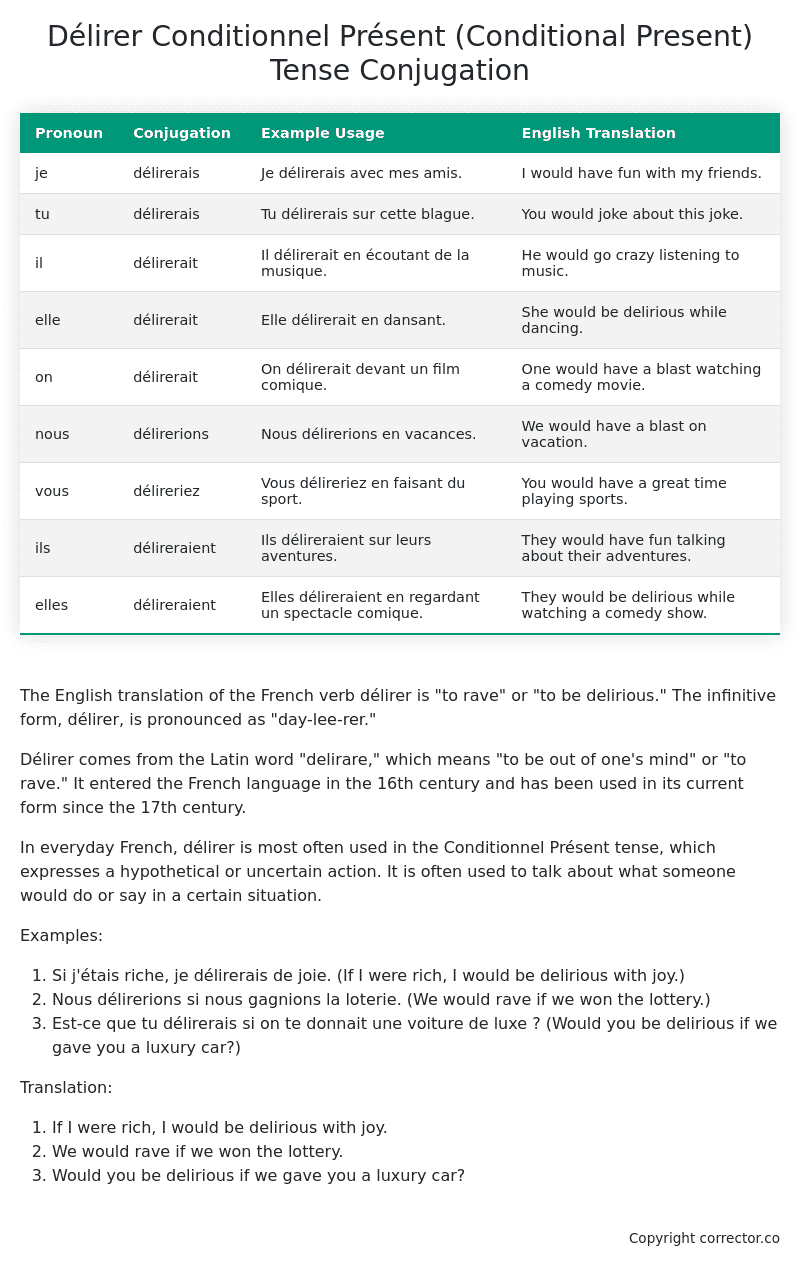Conditionnel Présent (Conditional Present) Tense Conjugation of the French Verb délirer
Introduction to the verb délirer
The English translation of the French verb délirer is “to rave” or “to be delirious.” The infinitive form, délirer, is pronounced as “day-lee-rer.”
Délirer comes from the Latin word “delirare,” which means “to be out of one’s mind” or “to rave.” It entered the French language in the 16th century and has been used in its current form since the 17th century.
In everyday French, délirer is most often used in the Conditionnel Présent tense, which expresses a hypothetical or uncertain action. It is often used to talk about what someone would do or say in a certain situation.
Examples:
- Si j’étais riche, je délirerais de joie. (If I were rich, I would be delirious with joy.)
- Nous délirerions si nous gagnions la loterie. (We would rave if we won the lottery.)
- Est-ce que tu délirerais si on te donnait une voiture de luxe ? (Would you be delirious if we gave you a luxury car?)
Translation:
- If I were rich, I would be delirious with joy.
- We would rave if we won the lottery.
- Would you be delirious if we gave you a luxury car?
Table of the Conditionnel Présent (Conditional Present) Tense Conjugation of délirer
| Pronoun | Conjugation | Example Usage | English Translation |
|---|---|---|---|
| je | délirerais | Je délirerais avec mes amis. | I would have fun with my friends. |
| tu | délirerais | Tu délirerais sur cette blague. | You would joke about this joke. |
| il | délirerait | Il délirerait en écoutant de la musique. | He would go crazy listening to music. |
| elle | délirerait | Elle délirerait en dansant. | She would be delirious while dancing. |
| on | délirerait | On délirerait devant un film comique. | One would have a blast watching a comedy movie. |
| nous | délirerions | Nous délirerions en vacances. | We would have a blast on vacation. |
| vous | délireriez | Vous délireriez en faisant du sport. | You would have a great time playing sports. |
| ils | délireraient | Ils délireraient sur leurs aventures. | They would have fun talking about their adventures. |
| elles | délireraient | Elles délireraient en regardant un spectacle comique. | They would be delirious while watching a comedy show. |
Other Conjugations for Délirer.
Le Present (Present Tense) Conjugation of the French Verb délirer
Imparfait (Imperfect) Tense Conjugation of the French Verb délirer
Passé Simple (Simple Past) Tense Conjugation of the French Verb délirer
Passé Composé (Present Perfect) Tense Conjugation of the French Verb délirer
Futur Simple (Simple Future) Tense Conjugation of the French Verb délirer
Futur Proche (Near Future) Tense Conjugation of the French Verb délirer
Plus-que-parfait (Pluperfect) Tense Conjugation of the French Verb délirer
Passé Antérieur (Past Anterior) Tense Conjugation of the French Verb délirer
Futur Antérieur (Future Anterior) Tense Conjugation of the French Verb délirer
Subjonctif Présent (Subjunctive Present) Tense Conjugation of the French Verb délirer
Subjonctif Passé (Subjunctive Past) Tense Conjugation of the French Verb délirer
Subjonctif Imparfait (Subjunctive Imperfect) Tense Conjugation of the French Verb délirer
Subjonctif Plus-que-parfait (Subjunctive Pluperfect) Tense Conjugation of the French Verb délirer
Conditionnel Présent (Conditional Present) Tense Conjugation of the French Verb délirer (this article)
Conditionnel Passé (Conditional Past) Tense Conjugation of the French Verb délirer
L’impératif Présent (Imperative Present) Tense Conjugation of the French Verb délirer
L’infinitif Présent (Infinitive Present) Tense Conjugation of the French Verb délirer
Struggling with French verbs or the language in general? Why not use our free French Grammar Checker – no registration required!
Get a FREE Download Study Sheet of this Conjugation 🔥
Simply right click the image below, click “save image” and get your free reference for the délirer Conditionnel Présent tense conjugation!

Délirer – About the French Conditionnel Présent (Conditional Present) Tense
Formation
Common Everyday Usage Patterns
Expressing Polite Requests
Expressing Hypothetical Situations
Expressing Doubt or Uncertainty
Interactions with Other Tenses
Present Tense
Past Tense
Future Tense
Conditional Perfect
Summary
Want More?
I hope you enjoyed this article on the verb délirer. Still in a learning mood? Check out another TOTALLY random French verb conjugation!


